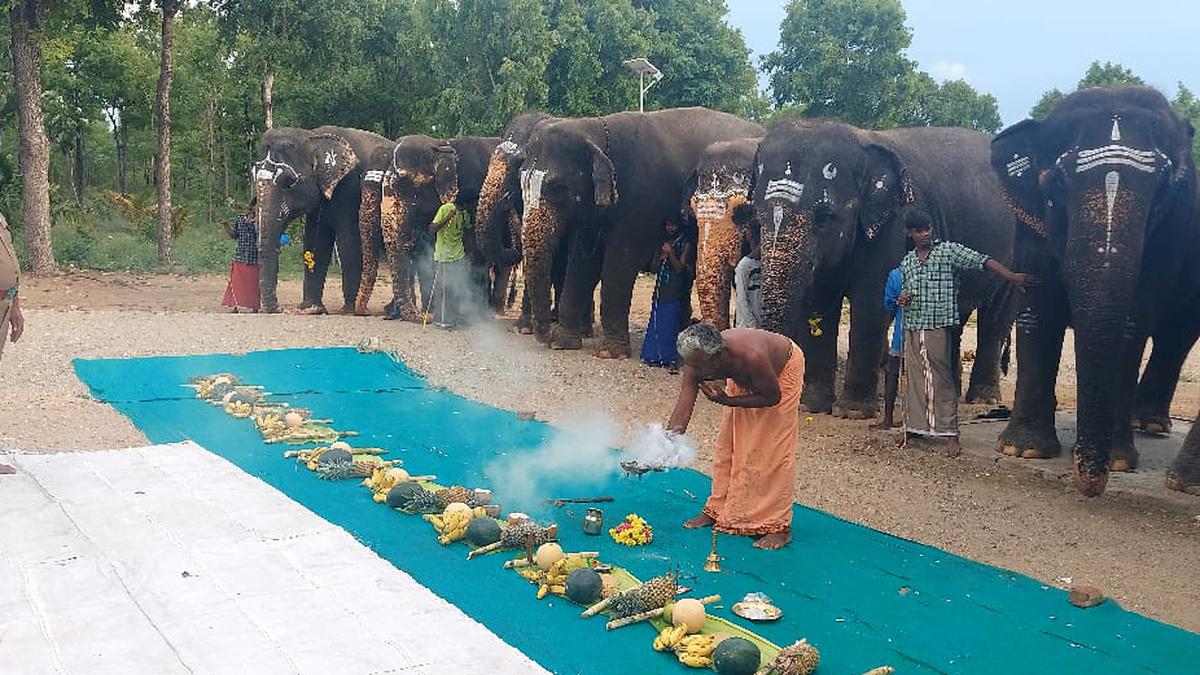
Captive elephants fed kozhukattai on Vinayaka Chaturthi at rescue centre
The Hindu
Celebration at Elephant Rescue Centre: 10 captive elephants given bath, made to stand side-by-side for Vinayaka Chaturthi. Deeparadhana performed, kozhukattai, sweet pongal, sugarcane & fruits fed. Mahouts & kavadis provide personalised care. Elephants enjoyed the delicacies & were in joyful mood.
It was celebration time at the Elephant Rescue and Rehabilitation Centre at M.R. Palayam near Tiruchi on Monday.
Pujas were performed at the centre housing 10 captive elephants that are being taken care of by a team of Forest officials. The occasion was Vinayaka Chaturthi and the Forest Department made arrangements to celebrate the event inside the nearly 50-acre centre established and maintained by it.
All elephants were given a bath and made to stand side-by-side at a particular spot for the celebration in the evening. A temporary employee engaged at the camp performed deeparadhana. Ten banana leaves containing kozhukattai and various fruits were spread on a mat in front of the pachyderms.
The rituals lasted about 30 minutes after which the jumbos were fed with kozhukattai, sweet pongal, sugarcane and fruits. The elephants enjoyed the delicacies and were in a joyful mood, said a Forest official. They were thereafter taken back to their shelter.
Every captive elephant at the centre, adjoining Tiruchi-Chennai national highway, is being taken care of by a mahout and kavadi. The pachyderms have been translocated to the centre from different places in the State and are being provided personalised care by the department officials.

“Writing, in general, is a very solitary process,” says Yauvanika Chopra, Associate Director at The New India Foundation (NIF), which, earlier this year, announced the 12th edition of its NIF Book Fellowships for research and scholarship about Indian history after Independence. While authors, in general, are built for it, it can still get very lonely, says Chopra, pointing out that the fellowship’s community support is as valuable as the monetary benefits it offers. “There is a solid community of NIF fellows, trustees, language experts, jury members, all of whom are incredibly competent,” she says. “They really help make authors feel supported from manuscript to publication, so you never feel like you’re struggling through isolation.”

Several principals of government and private schools in Delhi on Tuesday said the Directorate of Education (DoE) circular from a day earlier, directing schools to conduct classes in ‘hybrid’ mode, had caused confusion regarding day-to-day operations as they did not know how many students would return to school from Wednesday and how would teachers instruct in two modes — online and in person — at once. The DoE circular on Monday had also stated that the option to “exercise online mode of education, wherever available, shall vest with the students and their guardians”. Several schoolteachers also expressed confusion regarding the DoE order. A government schoolteacher said he was unsure of how to cope with the resumption of physical classes, given that the order directing government offices to ensure that 50% of the employees work from home is still in place. On Monday, the Commission for Air Quality Management in the National Capital Region and Adjoining Areas (CAQM) had, on the orders of the Supreme Court, directed schools in Delhi-NCR to shift classes to the hybrid mode, following which the DoE had issued the circular. The court had urged the Centre’s pollution watchdog to consider restarting physical classes due to many students missing out on the mid-day meals and lacking the necessary means to attend classes online. The CAQM had, on November 20, asked schools in Delhi-NCR to shift to the online mode of teaching.









